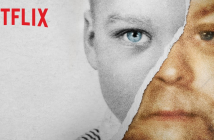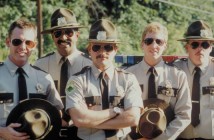
Editor’s Note: This month marks the 25th Anniversary of The Silence of the Lambs. Feel free to share your memories of this film in the comments section below.
Picture it: Thursday, February 14th 1991. You’re with your significant other and you decide to take them to the new movie opening. Odd that it’s opening on a Thursday, but maybe it’s romantic. You buy your tickets and sit down to The Silence of the Lambs, one of the greatest thrillers ever made and, if read in a superiorly creepy way, one of the oddest love stories ever put to film.
Both actors are so good that they upstage the plot, much like Bogart and Bacall did in both To Have and Have Not and The Big Sleep where the story is overridden by their chemistry.
The story is of FBI trainee Clarice Starling (Jodie Foster) who is called out of the classroom by Asst. Director Jack Crawford (Scott Glenn) to interview Dr. Hannibal Lecter (Anthony Hopkins), a convicted serial killer nicknamed Hannibal the Cannibal because he ate his victims, some of whom were his psychiatric patients. She’s there to surreptitiously gain information concerning the ongoing investigation into the ‘Buffalo Bill’ murders, a serial killer so named because he skins his victims much like the western character did to his buffalo kills. Lector takes a liking to Clarice in part because he gets to psychologically toy with someone new and in equal parts because he seems to respect her in some fashion. He helps her piece the clues together so she can find the killer in a sort of twist on Fritz Lang’s M from 1931 where the underworld of Berlin track a child murderer parallel to the police and even helping them so the underworld can go back to business as usual without the police cracking down on them because of this worse criminal.

The Buffalo Bill story is compelling, but it takes a back seat to the interactions Clarice has with Lecter. Both actors are so good that they upstage the plot, much like Bogart and Bacall did in both To Have and Have Not and The Big Sleep where the story is overridden by their chemistry. The four scenes they share together light this film on fire and save it from being a conventional procedural, despite it taking the angle of a woman trying to make her way in the man’s world of the FBI, making it one of the first to address the blatant sexism that is rampant throughout law enforcement and other areas (you’re welcome, Sicario). This aspect of the film is very well handled without being preachy. Nearly every man makes a pass at Clarice (except Lecter, interestingly) and her response is always a demure downward glance or a request to keep on task. She’s forced to accept that this is how things are and the best she can do is ignore it. it’s good that the film didn’t make that a crusade, but in simply calling attention to it, those acts of harassment made people uncomfortable and it was around the release of this film that things started to change for women in the workplace. It’s still not great, but there is at least that omnipresent prospect of an HR visit that makes men at least slightly more civil to their female coworkers.
It still thrills, scares and intrigues at the same level and possibly more, having been dissected and mulled over all these years and as long as that’s true, the answer to Dr. Lecter’s question is no, even all these years after Buffalo Bill was stopped, the lambs have not stopped screaming.
But still, as important as those touches are, the real meat of the film is the conversations between Lecter and Starling. He wants to know more about her, possibly to torment her and possibly to help her overcome her fears and become a good FBI agent. Lecter sees himself as a sage-like figure, even a good person, despite his murdering and eating several people. And Clarice sees that he’s trying to help her stand on her own and may even believe what he does: that he’s a good man (that has killed and eaten people). They approach each other as people, which is something neither experience much from others, and that’s why they connect. She doesn’t talk to him like she’s trying to crack him or that he’s some kind of monster (despite believing that) and he doesn’t talk to her as if she were an object there for his gratification. This mutual respect changes both of them, her more than him, for the better.
Those conversations would not have worked in the hands of lesser actors. Anthony Hopkins had been appearing in films since the great The Lion in Winter in 1968, though he was largely unnoticed until this role. He understood the nuance needed to play mentor to a younger woman without it turning sexual and though it was still creepy, it wasn’t older-man-preying-upon-a-young-woman creepy. He knew the balance between sophisticated and insane and walked the line straddling the two expertly. It’s as if he was born to play the part of Hannibal Lecter and he is the best one yet, as he was the second to take the role, after Brian Cox originated the role in Michael Mann’s 1986 film Manhunter, based on the first book of Thomas Harris’ to feature the character, Red Dragon (which was remade with the book’s title with Hopkins as Lecter) and subsequent films and TV shows have capitalized on his iteration of the character to varying success.
Foster had been acting in film and TV for nearly as long as Hopkins, debuting on The Doris Day Show in 1969 at age 7 and of course going on to be in Martin Scorsese’s Taxi Driver at 12 and winning her first Oscar in 1988 for The Accused, her second coming with this film. She matches Hopkins’ embellished performance with one that is subdued and almost skittish. Clarice is confident in her own abilities but seldom stands up for herself when she’s objectified or pushed aside. She seems to always be assessing when she can rebuke an advance, judging if doing so will give her a name for being ‘difficult’ (the term used to describe women that try to make chauvinists understand that women are equal) and if it will, she stands down. Foster is brilliant here, never letting what others do influence Clarice’s drive or determination to do what she feels is right.
Talk of this film is often limited to the stars (as can be noted in the prior paragraphs) and seldom is director Jonathan Demme given his due. He directs with subtlety and efficiency throughout the picture. He gives his characters time to regroup onscreen, so we can reflect on the fact that they, especially Clarice, are human and are influenced by what is going on around them. He also takes a page from Hitchcock in tension building, notably in the final confrontation between Buffalo Bill and Clarice. His use of close-ups and angles are also interesting, choosing to shoot portions of the Lecter/Starling conversations in close-up, their faces filling the screen. He does this to show the intense reactions each are having to the conversation developing, Clarice’s degrading emotional control (being shot from a low angle) and Lecter’s growing control (shot from a high angle, his chin down in a modified ‘Kubrick gaze’). He doesn’t bludgeon us with a message or sacrifice the drama of their conversations for more action and more investigation into Buffalo Bill. He lets things evolve naturally and only tightens the screws near the end.
The Silence of the Lambs is one of only three films to win all five top Oscars, for Picture, Director, Lead Actor (Hopkins) and Actress (Foster) and Screenplay (adapted), placing it in great company with It Happened One Night and One Flew Over the Cuckoo’s Nest. The film deserved all of those awards (the only five it was nominated for, incidentally) though it didn’t necessarily need them. The film is one of the best films ever made (maybe not top 100 if international films are included, but still a great film) and likely would be remembered even without all the accolades. It stands the test of time, still being as thrilling these 25 years after its release with none of the potency muted by the more extreme images we now get in films. It still thrills, scares and intrigues at the same level and possibly more, having been dissected and mulled over all these years and as long as that’s true, the answer to Dr. Lecter’s question is no, even all these years after Buffalo Bill was stopped, the lambs have not stopped screaming.



